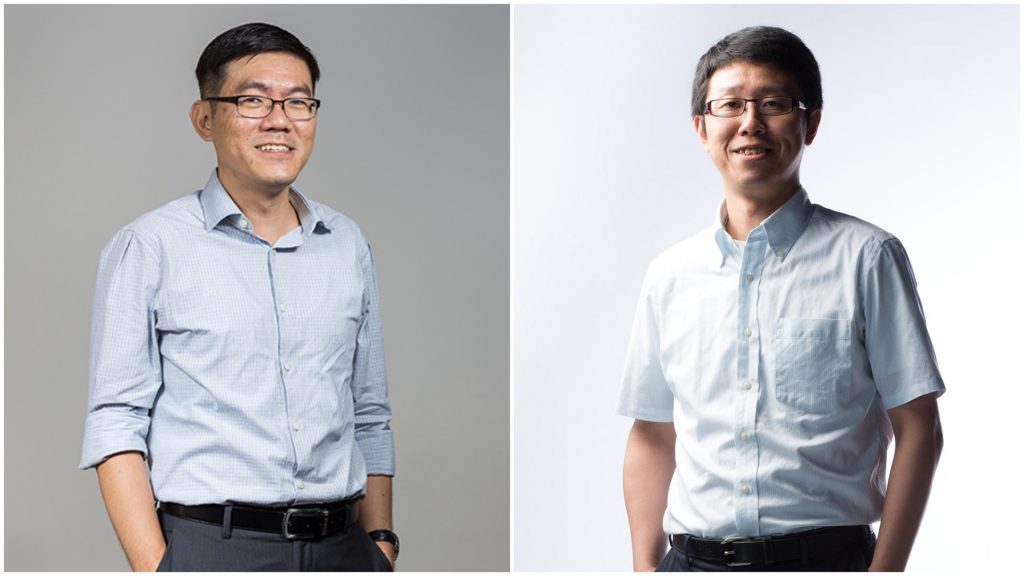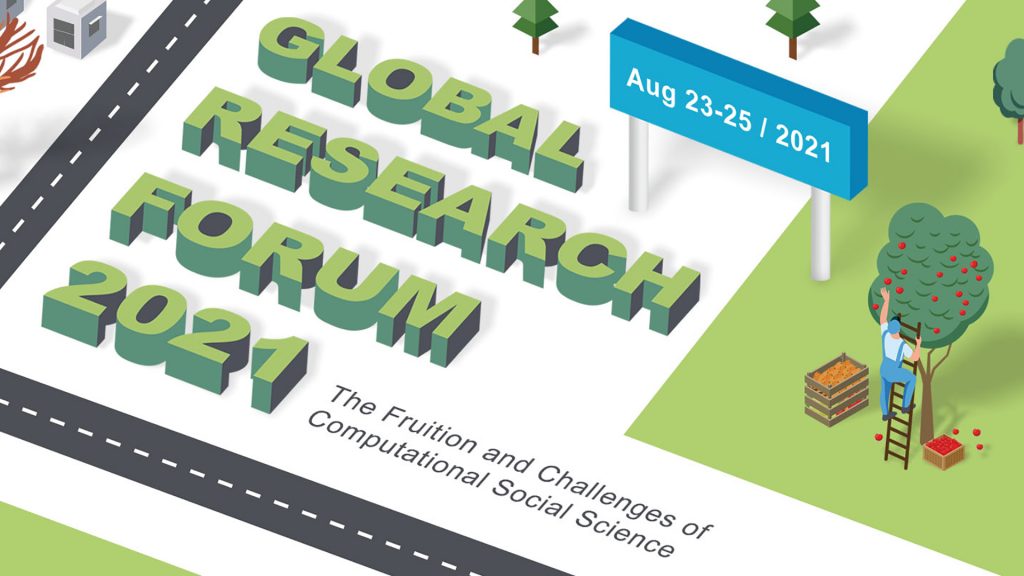Using Big Data to Understand Human Behaviour
August 16, 2021
IN BRIEF | 5 min read
-
To be held from 23 to 25 August, the Global Research Forum 2021: The Fruition and Challenges of Computational Social Science will see world-leading experts from both the traditional and computational social sciences converging online to present and discuss the potentials in this field, current challenges and the road ahead for computational social science from inter-disciplinary perspectives.

What are the reasons for vaccine hesitancy during the COVID-19 pandemic? How can governments enhance people’s well-being? How do we encourage people to eat healthily? The access to an unprecedented amount of data and scientists’ ability to analyse large datasets has led to a paradigm shift in tackling such questions on social behaviour – with computational social science (CSS) research witnessing huge growth in recent years.
Recognising the growing salience of this interdisciplinary research field in Singapore and Asia, the NUS Faculty of Arts and Social Sciences (FASS) and the NUS School of Computing’s Department of Information Systems and Analytics (DISA) are jointly organising the Global Research Forum 2021: The Fruition and Challenges of Computational Social Science. To be held from 23 to 25 August, the exciting forum will see world leading experts from both the traditional and computational social sciences converging online to present and discuss the potentials in this field, current challenges and the road ahead for computational social science from inter-disciplinary perspectives.
We spoke to FASS Communications and New Media Professor Jack Qiu, Co-Chair of the Global Research Forum Committee; and Associate Professor Tan Chuan Hoo, DISA Deputy Head of Research and Administration, who shared valuable insights into the rise of CSS and what participants can expect from the forum.
How is computational social science research useful in our daily lives?
Assoc Prof Tan: CSS research can come in useful in many ways – such as research into how to be smarter in our daily decisions (e.g., what to buy), to be cognisant of our daily diet (e.g., what to eat), and to be conscious of the information we receive daily (e.g., how to differentiate between fact, opinion and fake information).
Prof Qiu: Entertainment and social network sites are among the most intense users of CSS. If you watch YouTube videos, or listen to Spotify music, you provide data to the entertainment platforms about your preferences and your behavioural patterns while consuming their content. Such data would then help these companies, such as TikTok or iTunes, to automatically recommend to you other content that you are likely to also enjoy.
Why has computational social science gained global prominence in the past decade?
Prof Qiu: CSS has gained global prominence over the past decade due to the widespread use of digital technologies such as smartphones and e-payment applications, and the accompanied rise of big tech companies such as Google and Alibaba.
These are however private corporations, whose decision-making may or may not be in line with public interests, as we now know of the problematic role played by social media companies that was illustrated by the Cambridge Analytica scandal. Hence, governments and civil societies around the world have started to pay attention especially to the risks of CSS being abused, for instance, in elections.
Meanwhile, contact tracing during the COVID-19 pandemic creates another omnipresent scenario of CSS applications where behavioural trace data are used to reach public health goals. Both the pros and cons contribute to the salience of CSS in public discussions and in everyday life.

What impact has computational social science had in Singapore and the region, and how has it affected local and regional dynamics?
Assoc Prof Tan: Locally, with more data being readily available and the government recognising the need to share data and statistics (e.g., data.gov.sg), we are seeing the opportunities to analyse human behaviour and make causal inferences that would not have been possible in the past. This could address many important issues that were not possible previously, such as tackling misinformation and the spread of it, enhancing the physical and mental well-being of people through digital nudges, and establishing the causal impact of product recommendations and reviews for responsible marketing among numerous others.
Prof. Qiu: Much of Singapore's Smart Nation initiative has to do with CSS, for example, when high-definition personal mobility data are analysed to inform urban planning and the future construction of roads and residential neighbourhoods.
Assoc Prof Tan: Regionally, we are seeing an increase in the frequency and intensity of natural disasters, such as earthquakes, volcano eruptions, tsunamis and forest fires. This has led to a large number of displaced persons and an increased demand for swift humanity responses from non-governmental organisations and government agencies. With more digitised and shared data, the physiological and psychological well-being of the displaced persons, as well as the responders, can be significantly improved.
What are some ways that you expect the field could expand and evolve during the next five to ten years?
Assoc Prof Tan: In the next five to 10 years, the healthcare services, for example, can be very different from what we have today, predominantly driven by artificial intelligence (AI), analytics and social sciences. For example, you can get personalised medical attention based on your genomic data when you need it, receive real-time AI nudges to help you eat better and be healthier, and even interact with intelligent robots that respond to natural human emotional feedback.
Prof Qiu: I expect to see the field becoming more transparent about data capture and sharing, and about the ethics of collaboration and automated decision-making, in the spirit of Open Science. This will require CSS scholars to engage with concerned citizens, members of parliament and digital media companies. It will also require institutional reform within universities so that humanistic thinking and computational approaches can better cross-fertilise. The new NUS College of Humanities and Sciences (CHS) is one such place where I anticipate to see CSS being elevated to the next level of ethical and sustainable development.

Could you share about some of the exciting topics or projects that will be discussed at the forum?
Prof Qiu: The three-day event will be information-packed and feature a star-studded list of speakers. Join us, and you will meet some of the world's leading CSS scholars from the US, China, Ireland, as well as leading researchers from across many NUS departments.
I am thrilled to see so much interest on social networks, which will be addressed by our keynote speakers and presenters at this Global Research Forum. These include not only online networks of both people and content, for example, memes; but also, social networks broadly defined, including offline relationships, which help young Singaporeans to find jobs through their strong or weak ties. These are classic social science topics now being tackled in today's contexts, computationally.
It is also exciting to see colleagues deploying experimental design, which is a tool that I think should receive more attention compared to data mining. At the forum, we will learn about online experiments carried out through social media as well as field experiments related to Singaporeans' water conservation and sustainable development. These are exciting topics in themselves. There is another reason, though – CSS is often criticised for being too data-driven. However, good experimental design emphasises theoretical development and simplicity in modelling. I therefore think these studies should be really important and interesting.
A key takeaway would be a deeper appreciation of interdisciplinary research where humanity needs to come together and address the most pressing issues of our time, be they COVID-19 or misinformation or environmental sustainability. CSS emerges, not because computers have become more powerful, but because humanity and Planet Earth are facing existential crises, now more than ever, at least in most people's memory. It is these big problems that propel interdisciplinary collaboration through CSS using cutting-edge computational research tools, and for which CSS shall keep its most valuable promises.
Do register for the forum here if you’re keen to find out more about CSS and our research!
This story first appeared on NUSnews on 16 August 2021.

